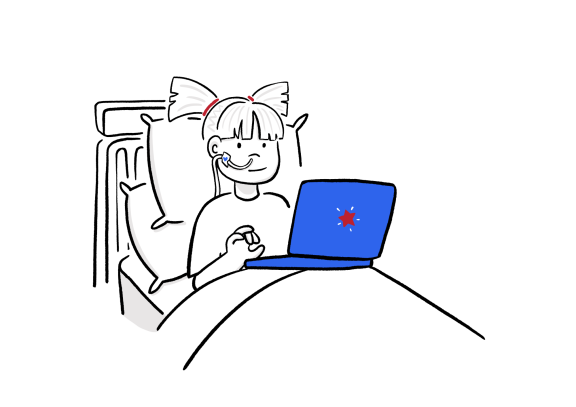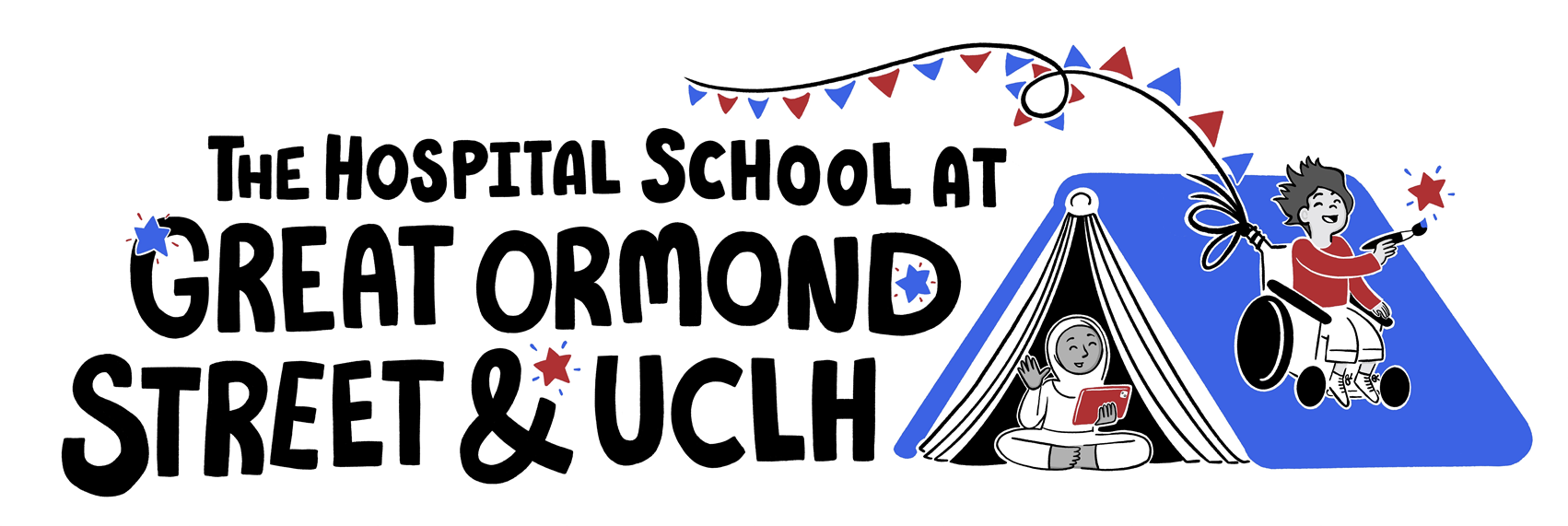Our Curriculum
We plan closely with our NHS colleagues to ensure that learning is an integral part of pupils’ admissions and that stress around falling behind at school is minimised. We want pupils to have fun when learning at our school and recognise that engaging in learning and being motivated to achieve educational goals can promote overall well being and be a key part of recovery. We work both within and beyond the framework of the National Curriculum, helping pupils to continue to make progress in core subjects, whilst also encouraging understanding and appreciation of the arts, humanities and technology and developing their spiritual, moral, cultural and social education. We also mark national events and celebrations that are familiar features of pupils’ home school calendars.

Our curriculum is planned and delivered in line with our school values of ‘Nurture, Innovate, Collaborate, Empower’ and our core aims of ‘Achievement, Continuity & Enjoyment’. We plan in collaboration with teachers in pupils’ home schools to ensure continuity of education that, as far as their health permits, replicates that which they would be able to access outside the hospital. Our approach is child-centred and child-led, allowing pupils to take ownership of their learning at a time when they are experiencing reduced autonomy and isolation from familiar people and environments.
We work with pupils who have come from a wide variety of special and mainstream educational settings. We also work with those who are homeschooled, currently not in education, or who may not yet have had the opportunity to begin their education. We teach pupils for whom English is not the first language and also those at the earliest stages of language development. We support pupils with EHCPs to work toward the outcomes set out in these plans.
We include the views of the child, their families, other education professionals and hospital teams to craft a bespoke and personalised curriculum for each child.
We are committed to personalising the curriculum in response to pupils’ individual needs and interests. Hospital school teachers plan together with pupils, their families, their home schools and their hospital teams, and develop a completely personalised curriculum for each child that takes into account their individual starting points, learning needs, current presentation and goals.
Keeping up with work from their home school is very important for many pupils. For others, who may have been out of education for some time, our own personalised hospital school curriculum is the best starting point. Often, a blend of the home school and hospital school curricula is ideal; this supports successful re-integration post-discharge and also allows pupils to feel included in the hospital school community during their stay.
Core subjects are always prioritised but providing pupils with the opportunity to express themselves through art, practice relaxation techniques through yoga and learn how to keep themselves safe in the online world are equally important.
Uploads/Our-Personalised-Curriculum-2.mp4
Watch our short animation to find out more about our Personalised Curriculum that has each child at its centre.
We recognise that every child and young person is on a different learning journey and we personalise the curriculum for all our pupils. Here are some examples of approaches we may use in lessons for pupils with complex needs:
Long periods of time away from school, the impact of treatment or a change in a child’s ability to engage with activities they have previously enjoyed can leave them feeling unmotivated and apprehensive about school. We understand that getting ready to learn again after becoming unwell requires encouragement and the right support. We may suggest starting with just 10 minutes of engagement activity a day, perhaps focusing on a game or puzzle or their own interests, building up slowly over time to engage with a full lesson. Alternatively, planning to take part in one or two lessons a week may be enough initially, growing to daily lessons when the pupil feels ready.
We know that transition at any stage of education can be challenging and we aim to support all transitions - whether that is from hospital school to home school, from our primary team to our secondary team, from one teacher to another or from lessons on the ward to lessons in the schoolroom. Just like our education provision, this support is planned and personalised with each pupil at the centre in collaboration with the multi-disciplinary and local teams.
We recognise and celebrate pupils’ achievements with a wide range of internal and external awards. Each week teachers nominate pupils for Friendship, Determination and Engagement, Star of the Week and Work of the Week awards which are announced and celebrated in an online assembly.
Long-stay pupils are also supported to work towards the nationally recognised Arts Award, STEM Crest Award and individualised AQA Unit Awards.
For pupils in exam years, the hospital school is able to act as a host centre so that pupils can sit their GCSE and A-Level exams whilst in hospital. They can even do this from their hospital bed; we will liaise with home schools and NHS colleagues to ensure that all access requirements are met and pupils are well supported to take their exams if they would like to.
Supporting pupils to work towards their future aspirations is an important part of our personalised curriculum. We work with the Camden Connexions service to provide tailored advice for pupils in Key Stage 4, helping them to make informed decisions about their post-16 learning pathways, and we also support pupils to access both online and in-person work experience opportunities.
For our pupils, who may not have the opportunity to leave the hospital building for weeks or months at a time, we aim to bring the outside world into our lessons. We partner with visiting artists and specialist practitioners from local museums, galleries and charitable organisations including Singing Hands, Chance 2 Shine, National Portrait Gallery, The Philosophy Foundation, Chefs Adopt a School, All Dogs Matter, and many more.
We are also fortunate to be able to enrich our curriculum through engaging with the fascinating and innovative work of the hospitals in which we work. Pupils can explore the hospital archives, get hands-on learning opportunities with the Research and Infection Control Teams, take part in Careers and Play Street events and experience live performances and high-quality artist-led workshops through GOSH Arts.
Pupils who are able to leave the hospital site can take part in school visits to local, accessible museums and galleries which offer excellent educational programmes and include The Dickens Museum, October Gallery, The British Museum and The Transport Museum, or they may visit a local cafe as part of planned work to develop independence and life skills. We also run regular virtual workshops with special visitors; past highlights include meeting the zoo keepers and their animals at London Zoo and talking to astronaut Tim Peake about his time on the international space station.
We recognise our pupils as individuals and celebrate their progress and achievements; whether this be their engagement, interest, communication, confidence, collaboration or academic progress.
Regular opportunities to connect with other hospital school pupils online to work collaboratively, discuss and share work supports pupils’ character development at a time when they are away from their usual peer group. They also have opportunities to join home school events and lessons remotely if they’d like to.
We mark many events that would be familiar to pupils from their home school calendars such as Sports Day, end of term celebrations, theatrical performances, nationally marked celebration and awareness days and religious festivals, allowing pupils to continue their spiritual, moral, social and cultural education whilst attending the hospital school.
We know that children and young people with medical needs and disabilities are at greater risk of developing a mental health difficulty than their peers. Our PSHE and RSE teaching focuses on supporting pupils’ mental health and overall wellbeing through activities that develop confidence, esteem and resilience and promote inclusion, kindness and the celebration of difference.
Wherever possible, we prioritise in-person teaching but know that for our pupils, who must sometimes spend periods in protective isolation, online teaching can be an effective alternative to ensure continuity of education, or a complement to in-person teaching for those able to access it.
In addition to daily in-person lessons, we have a weekly programme of online group lessons that pupils of different ages are able to join along with their teacher, a parent or independently. These collaborative lessons include Welcome Wednesday (for our younger learners), Creative Club (for our older learners) and Ukulele Club and a weekly Celebration Assembly (for all ages). We use communication platforms, such as Zoom and Google Chat, to link together our schoolrooms to our ward pupils to enable engagement with a wider peer group for whole school celebrations or visitor-led sessions.
We are well resourced with the latest technology that enables us to provide optimum access to learning and facilitate engagement for all. We use technology confidently and safely, to support and enhance teaching and learning across the whole school. Pupils have the opportunity to make virtual visits using VR headsets, learn how to code and programme, make and record music, produce and edit imagery and explore cause and effect through switches and specialist SEND tech equipment like the interactive SENSE Micro.
